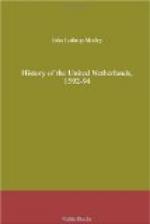This place, very strong by art and still stronger by-nature, was the other key to all north Netherland—Friesland, Groningen, and Drenthe. Should it fall into the hands of the republic it would be impossible for the Spaniards to retain much longer the rich and important capital of all that country, the city of Groningen. Coeworden lay between two vast morasses, one of which—the Bourtange swamp—extended some thirty miles to the bay of the Dollart; while the other spread nearly as far in a westerly direction to the Zuyder Zee. Thus these two great marshes were a frame—an almost impassable barrier—by which the northern third of the whole territory of the republic was encircled and defended. Throughout this great morass there was not a hand-breadth of solid ground—not a resting-place for a human foot, save the road which led through Coeworden. This passage lay upon a natural deposit of hard, dry sand, interposed as if by a caprice of nature between the two swamps; and was about half a mile in width.
The town itself was well fortified, and Verdugo had been recently strengthening the position with additional earthworks. A thousand veterans formed the garrison under command of another Van den Berg, the Count Frederic. It was the fate of these sister’s-children of the great founder of the republic to serve the cause of foreign despotism with remarkable tenacity against their own countrymen, and against their nearest blood relations. On many conspicuous occasions they were almost as useful to Spain and the Inquisition as the son and nearly all the other kinsmen of William the Silent had rendered themselves to the cause of Holland and of freedom.
Having thoroughly entrenched his camp before Coeworden and begun the regular approaches, Maurice left his cousin Lewis William to superintend the siege operations for the moment, and advanced towards Ootmarsum, a frontier town which might give him trouble if in the hands of a relieving force. The place fell at once, with the loss of but one life to the States army, but that a very valuable one; General de Famars, one of the original signers of the famous Compromise; and a most distinguished soldier of the republic, having been killed before the gates.
On the 31st July, Maurice returned to his entrenchments. The enemy professed unbounded confidence; Van den Berg not doubting that he should be relieved by Verdugo, and Verdugo being sure that Van den Berg would need no relief. The Portuguese veteran indeed was inclined to wonder at Maurice’s presumption in attacking so impregnable a fortress. “If Coeworden does not hold,” said he, “there is no place in the world that can hold.”
Count Peter Ernest, was still acting as governor-general for Alexander Farnese, on returning from his second French campaign, had again betaken himself, shattered and melancholy, to the waters of Spa, leaving the responsibility for Netherland affairs upon the German octogenarian. To him; and to the nonagenarian Mondragon at Antwerp, the veteran Verdugo now called loudly for aides against the youthful pedant, whom all men had been laughing at a twelvemonth or so before. The Macedonian phalanx, Simon Stevinus and delving Dutch boors—unworthy of the name of soldiers--seemed to be steadily digging the ground from under Philip’s feet in his hereditary domains.




